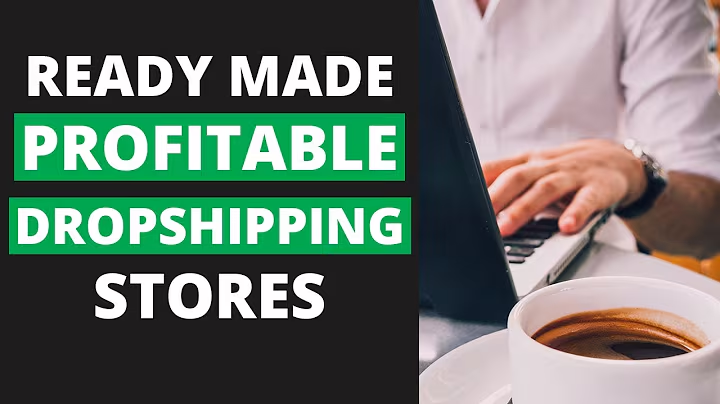The Ultimate Guide to Private Label Dropshipping
Table of Contents
- Introduction
- What is Private Label Drop Shipping?
- The Basics of Drop Shipping
- Understanding Private Labeling
- The Advantages of Private Label Drop Shipping
- The Disadvantages of Private Label Drop Shipping
- Best Private Label Drop Shipping Suppliers
- Alibaba
- AliExpress
- Supply Me Direct
- Printed Mint
- Magnum Coffee Roastery
- How to Start a Private Label Drop Shipping Business
- Conduct Product Research
- Contact a Private Label Supplier
- Choose Your Selling Channel
- Implement Marketing Strategies
- Focus on Customer Success
- FAQ
Private Label Drop Shipping: A Lucrative Opportunity for E-commerce Store Owners
If you're an e-commerce store owner or a drop shipper looking to stand out from the competition and increase customer loyalty, private label drop shipping may be the solution you've been searching for. By branding your products and packaging, you can differentiate yourself from other sellers and build trust with your customers. In this article, we'll explore the world of private label drop shipping and how you can start your own business with some of the best private label suppliers available today.
What is Private Label Drop Shipping?
Before delving into the details, let's clarify what private label drop shipping actually means. Drop shipping, in its essence, is the practice of selling products without holding them in stock. Instead, you partner with suppliers who fulfill orders directly to your customers. Private labeling, on the other hand, involves adding your own brand to the product and packaging. This branding creates customer trust and loyalty, setting you apart from sellers who simply use white labels or sell products with the manufacturer's branding. Private label drop shipping combines these two concepts, allowing you to sell products without inventory while adding your own brand identity.
The Basics of Drop Shipping
To fully understand private label drop shipping, it's important to grasp the basics of drop shipping itself. In a typical drop shipping business model, you sell products on your online store without having to hold any inventory. When a customer makes a purchase, you simply fulfill the order by purchasing the product from a supplier and having it shipped directly to the customer. The profit you make is the difference between the price you sell the product for and the price you pay the supplier.
Understanding Private Labeling
Private labeling goes beyond the traditional drop shipping model. It involves adding your own brand identity to the product and its packaging. By doing so, you create a unique product that customers can easily identify and remember. This branding fosters customer loyalty and trust, ultimately leading to repeat purchases and increased profits. Unlike working with wholesale or retail suppliers who ship out products with their own branding, private labeling allows you to differentiate yourself and establish a strong brand presence in the market.
The Advantages of Private Label Drop Shipping
-
Customer Loyalty: When customers connect with your brand, they are more likely to stay loyal to your products. Private label drop shipping allows you to build that connection and create a base of loyal customers who not only make repeat purchases but also refer your brand to their friends and family.
-
Low Investment Costs: Compared to traditional private label selling, private label drop shipping offers low initial investment costs. This is because your suppliers take care of manufacturing, branding, and distribution. You only pay the suppliers once you receive payment from your buyers, minimizing upfront inventory expenses.
-
Stand Out from the Competition: Private labeling gives you the freedom to stand out from the competition. By adding your brand identity to your products and packaging, you differentiate yourself from sellers who simply forward items as they are from the manufacturer. This uniqueness helps you attract more customers and increase sales.
-
Adaptability and Innovation: Private label drop shipping allows you to easily adapt and evolve your product offerings. With suppliers taking care of manufacturing and branding, you can focus on finding trending products to manufacture and brand under your own label. This flexibility enables you to stay ahead of the market and dominate your niche.
The Disadvantages of Private Label Drop Shipping
-
Difficulty in Finding Suppliers: Private label suppliers may be hesitant to manufacture products without a proven track record or upfront payment. In the beginning, you'll likely need to build a relationship with suppliers and show them your sales record or guarantee future sales to convince them to manufacture your products.
-
Minimum Order Quantity (MOQ): Many suppliers require a minimum order quantity before they will manufacture and brand your product. This can be problematic for drop shippers who aim to sell products without holding inventory or paying for it in advance. Over time, as you establish a proven track record, suppliers may be more open to producing smaller orders.
-
Slow Movers: In the private label drop shipping model, you are responsible for selling slow-moving products. Unlike traditional drop shipping businesses, where you can easily remove products that aren't selling well, private label products have already been manufactured and branded specifically for you. Selling slow-moving products requires additional effort and may delay your ability to introduce new trending products.
-
Uncertainty in Product Quality: Trusting your supplier to manufacture high-quality products is crucial. Poor-quality products can lead to customer dissatisfaction, returns, and refund requests. Ensure you work with reputable, high-quality suppliers who understand your expectations and can deliver products that match their description.
Best Private Label Drop Shipping Suppliers
-
Alibaba: With millions of products available, Alibaba is a leading platform for finding private label drop shipping suppliers. The extensive product range allows you to source a wide variety of products, and Alibaba's verification system helps you choose reliable suppliers. Additionally, Alibaba offers secure payment options and its own shipping services, simplifying the drop shipping process.
-
AliExpress: As a sister site of Alibaba, AliExpress caters to drop shippers and end consumers looking for products without a minimum order quantity. While you can't directly private label products on AliExpress, you can use it to find trending products and then negotiate private labeling services with suppliers on Alibaba.
-
Supply Me Direct: Supply Me Direct is a B2B wholesale platform that specializes in private label drop shipping within the beauty and fabric niches. While their selection may be limited compared to Alibaba, they offer integration with major e-commerce platforms and faster shipping times.
-
Printed Mint: If you're interested in print-on-demand products, Printed Mint is an excellent option. They allow you to create customized products with your designs and branding, offering a wide range of niche categories such as home, apparel, baby and kids, mugs and drinkware, pets, and tech products. Printed Mint takes care of the manufacturing, packaging, and shipping, making it an attractive choice for those looking for low upfront costs.
-
Magnum Coffee Roastery: For those focusing on the coffee niche, Magnum Coffee Roastery is a dedicated wholesale supplier that offers private label options. They provide high-quality coffee products and can brand them with your custom graphics and packaging. Additionally, they offer internal marketing services to help promote your brand.
These suppliers vary in product offerings, pricing, and services. Research and evaluate each supplier to determine which best aligns with your business goals and target market.
How to Start a Private Label Drop Shipping Business
Now that you have an understanding of private label drop shipping and some reputable suppliers to work with, let's outline the steps to start your own successful business.
-
Conduct Product Research: Begin by researching product trends and identifying products with high potential for success. Utilize tools like the AliExpress dropshipping Center, AutoDS Product Research tool, or our curated product lists on the Autods blog and YouTube channel to source trending products.
-
Contact a Private Label Supplier: Reach out to the suppliers that align with your chosen products and negotiate private labeling services. Provide them with all the necessary information, including your branding requirements, product dimensions, and proven sales record if available.
-
Choose Your Selling Channel: Decide where you will sell your private label products. Options include traditional e-commerce platforms like Shopify or Wix, online marketplaces like eBay or Facebook Marketplace, or a combination of these channels. Each has its own advantages and limitations, so choose the channel(s) that best suit your business objectives and target audience.
-
Implement Marketing Strategies: Develop a marketing plan to promote your products and generate sales. This may include paid advertising through platforms like Facebook Ads, email marketing campaigns, influencer marketing, or utilizing promotional features on platforms like eBay or Facebook Marketplace.
-
Focus on Customer Success: Take care of your customers and provide exceptional customer service. Respond promptly to inquiries, address any issues or concerns, and ensure a seamless buying experience. Building a loyal customer base is essential for long-term success.
By following these steps and adapting to your specific business needs, you can establish a private label drop shipping business that sets you apart from the competition and drives sales.
FAQ
-
How can I find trending products to sell in my private label drop shipping business?
- There are several methods for finding trending products, such as utilizing tools like the AliExpress Dropshipping Center, AutoDS Product Research tool, or curated product lists on the Autods blog and YouTube channel. These resources provide insights into current market trends and popular product categories.
-
Can I use my own branding and logo on the products I sell through private label drop shipping?
- Yes, private label drop shipping allows you to add your own branding and logo to the products and packaging. This enhances brand recognition and customer loyalty.
-
Are there any limitations to drop shipping on platforms like eBay or Facebook Marketplace?
- While platforms like eBay and Facebook Marketplace offer the advantage of free organic traffic, there may be limitations on product listings, particularly for new seller accounts. These platforms gradually increase selling limits as you establish a track record. Additionally, customization options may be limited compared to platforms like Shopify, where you have full control over your online store.
-
How can I market my private label drop shipping products effectively?
- Marketing strategies for private label drop shipping include paid advertising on platforms like Facebook Ads, email marketing, social media promotions, and influencer marketing. Tailor your marketing efforts to reach your target audience and increase brand visibility.
-
What is the best way to handle customer inquiries and provide exceptional customer service?
- It is essential to promptly address customer inquiries and concerns. Utilize platforms like Shopify, Wix, eBay, or Facebook Messenger to manage customer messages efficiently. Maintain open communication, provide timely responses, and offer solutions to ensure customer satisfaction.
With these answers in mind, you are ready to embark on your private label drop shipping journey. Remember to continuously adapt and optimize your strategies based on market trends and customer feedback. Good luck building a successful private label drop shipping business!















